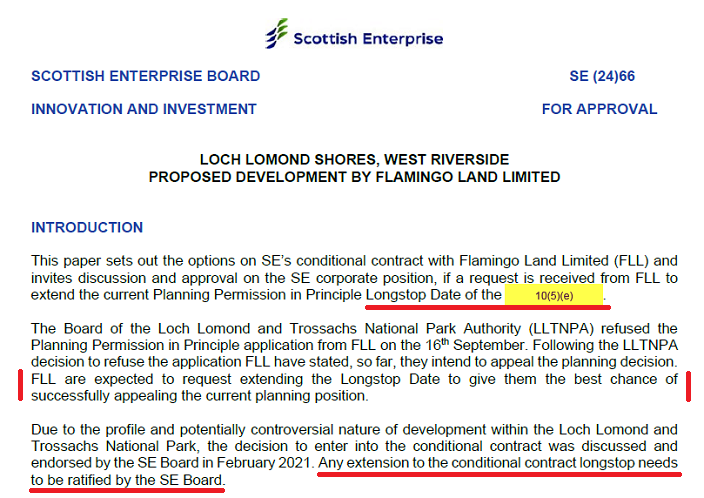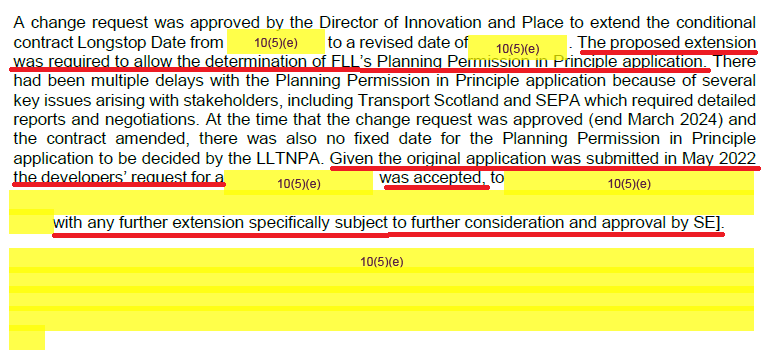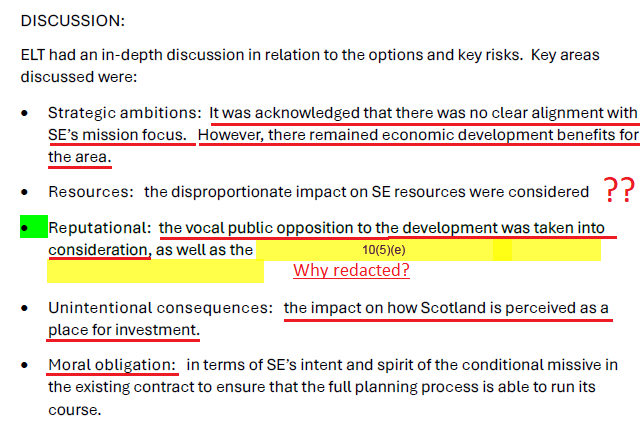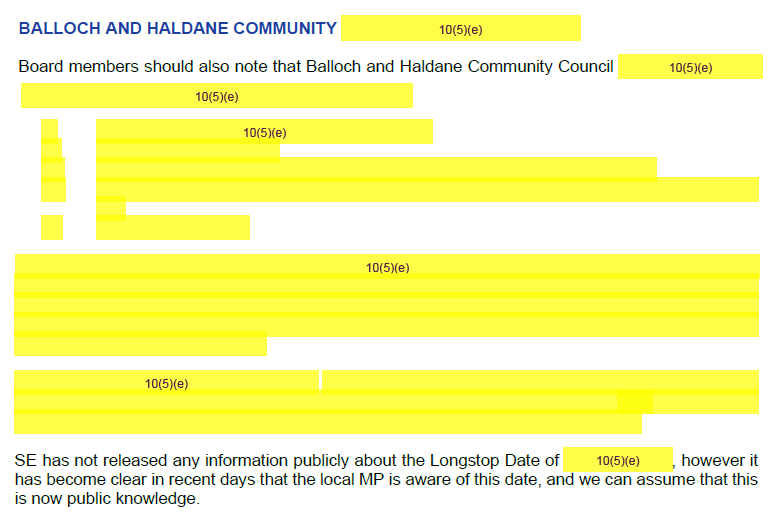
When first writing about the renewal of Scottish Enterprise (SE)’s Conditional Missives (Exclusivity Agreement) with Flamingo Land (see here) I had argued it was not clear if SE had voluntarily extended the agreement or was contractually obliged to do so.
I had previously submitted a Freedom of Information request on 14th January asking SE to provide the appropriate contractual clauses in the public interest. Yesterday, I received a response. SE have refused to provide the contractual clauses under the Environment Information Regulations (EIRs) claiming to do so might “cause substantial harm to the legitimate economic interests of the developer, Flamingo Land (FL) and SE itself; and prejudice legal proceedings”
SE have, however, helpfully provided the other information I request about HOW the decision was taken including papers to their Executive Leadership Team in 15th October 2024 and the SE Board on 25th October along with the minute. These papers show that SE decided to extend the conditional missives voluntarily to enable Flamingo Land to appeal the refusal of planning permission by the Loch Lomond and Trossachs National Park Authority (LLTNPA).
How and why SE decided to enable Flamingo Land to appeal
The Conditional Missives contained what are known as “Longstop Dates”, deadlines to be met if the contract was to proceed. The Board Paper reveals that the original Longstop Date for Planning Permission in Principle from the LLTNPA was extended by staff in March 2024 because of “multiple delays” which, it was claimed, was not Flamingo Land’s fault:

While both the old and new Longstop Dates have been redacted from the information supplied, the last line which states “any further extension specifically subject to further consideration and approval by SE” shows SE did not have to extend their Exclusivity Agreement but chose to do so.
The paper considered by SE’s Executive Leadership Team on 15th October 2024 shows they were concerned that if SE did not clarify if they would extend the new Longstop Date further “this could influence whether or not FLL do decide to pursue a planning appeal or potentially withdraw from the project.” It appears therefore that the new Longstop Date was for sometime this calendar year and could have “interfered” with the appeal process which can take up to almost a year.
Faced with a decision about whether to support Flamingo Land’s appeal or potentially kyboshing it, staff argued:
“Whilst respecting the unanimous decision of the LLTNPA Planning Board as well as the scale of public opposition to the plans, this is effectively the first step in the planning process. There is a well-established and recognised route of planning appeal in Scotland. If SE elect not to allow an appeal to be considered it could be argued to be acting unreasonably by the developer. Adopting this position may also negatively impact SE’s market reputation when seeking to attract development partners and infrastructure investment in other SE assets such as Broomielaw or BioQuarter.”
The perceived importance of not doing anything that might upset development interests is also reflected in the minute of the Board Meeting which stated “not seeing through the agreement in terms of spirit and intent which may have unintended consequences for other projects, and sending the wrong message to future developers”.
The minute of the Executive Leadership Team records all the factors taken into account in the decision (which are also recorded more briefly in the Board minute). They are revealing:

The first point is pretty devastating. It appears that the proposed Flamingo Land development no longer aligns with SE’s mission focus although the reasons why are not explained. Perhaps its because SE is now more focussed on supporting “green” development and Flamingo Land is anything but that?
Unfortunately SE staff failed to inform their Board that the LLTNPA in refusing the planning application had judged that the social and economic impact of the development was “neutral”. They also misinformed their Board about Flamingo Land’s ‘Lomond Promise’, claiming it was “a legally binding promised (sic) to the local community which includes no zero hours contracts and paying staff the Real Living Wage”. For that to be the case there would have had to be a legally enforceable contract with a local community organisation and there was none. Had staff been clearer about the likely economic impact of the proposed development perhaps their Board would have decided it was time to get out of their agreement with Flamingo Land and hand over the land to the local community?
What was meant by “the disproportionate impact on SE resources” was not explained and could have referred either to the resources required to deal with the “vocal public opposition” or the resources needed to deal with a legal challenge from Flamingo Land.
Overall, however, it was a case of business before people, of putting the interests of Flamingo Land, a business based down in England before the local community in Balloch. It says something that SE sees its “moral obligation” as being to such businesses rather than the people of Scotland. Moreover, what was said to the SE Board about the interests of the people of Balloch has been completely redacted on grounds of SE’s economic interests:

The key conclusion from all of this is whatever the thinking of Scottish Enterprise, because they extended their agreement with Flamingo Land voluntarily the Scottish Government could have intervened and stopped the appeals process in the interests of the local community and the National Park. Scottish Ministers have chosen not to do so.
The LLTNPA, the Flamingo Land development and the appeal

This provides further evidence (see Flamingo Land Story Part 1) that the LLTNPA Chief Executive, Gordon Watson, was not telling the truth when he claimed the LLTNPA had not been involved in the appointment of Flamingo Land and had no conflict of interest in the application. Neither James Stuart, when he was convener, or Heather Reid, the current convener was prepared to investigate this complaint when I asked them to do so but instead referred the matter to staff – managed by Mr Watson. The outcome was predictable, tripe!
All this explains why the LLTNPA backed the development for years (see Flamingo Land Story Part 2), including in last year’s National Park Partnership Plan, and also why the grounds LLTNPA staff eventually gave for refusing the development were so weak.
I submitted my own objection to the appeal, referring to this history and based on the reasons explained in my last post (see here) two days before the DPEA’s then deadline of 7th February.
Meantime, while the DPEA received the LLTNPA’s response to Flamingo Land’s appeal on the deadline date of 31st January, they did not publish this until the 5th. That left the public two days to comment on the 36 documents submitted by the LLTNPA. I wrote to the DPEA ask for an extension because the rules on appeals allow the public 7 days to respond AFTER the planning authority (this was based on points Ian Cowan had made in his representation on behalf of Ross Greer, MSP). The Reporter, Mr Buylla, bluntly refused my request, claiming the purpose of the planning system was not to enable the public to comment on what the LLTNPA had submitted. Following further representations, however, from Ian Cowan he appears to have had a change of heart and has now extended the deadline for the public to comment until 17th February!
You can view the documents submitted by the LLTNPA (here) and submit any comments on their attempt to justify their position, including the weaknesses in their arguments, to Lomondbanksappeal@gov.scot
Scotland’s Enterprise agencies & the planning system in our National Parks
The evidence I have considered in multiple posts demonstrates that both Scotland’s enterprise agencies and the planning system is stacked against the public and the public interest.
In the case of the enterprise agencies the solution in our National Parks should be simple. The enterprise agencies should no longer be allowed to own property in National Parks and their existing properties at Cairn Gorm, in the case of Highlands and Islands Enterprise, and Balloch, in the case of SE, should be transferred to other public authorities and local communities. With Balloch no longer aligning with SE’s mission, the case for this is incontrovertible.
Changing the planning system is more difficult but again, in our National Parks, if proper weight was given to their statutory aims, developments such as that proposed by Flamingo Land would have never seen the light of day. I argued this in my own submission to the appeal, submitted on 6th February but still not published on the DPEA website building on what I argued in my last post (see here). It will be interesting to see if Mr Buylla, the Reporter, is prepared to put more weight on the National Park’s statutory aims than the LLTNPA has done to date.
